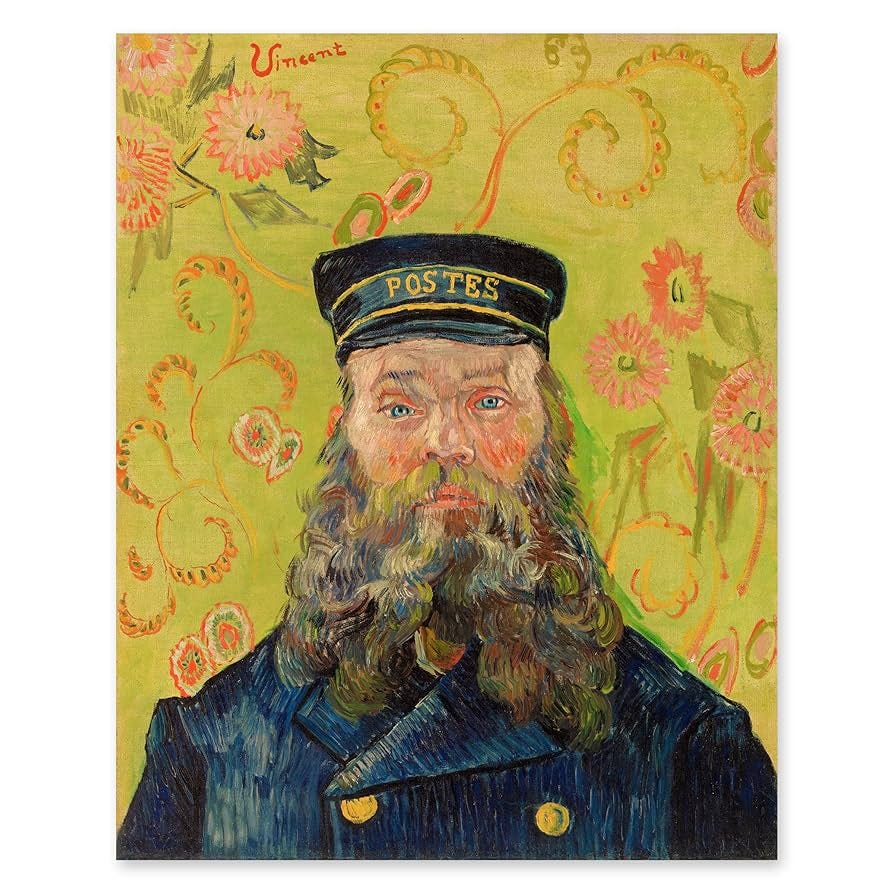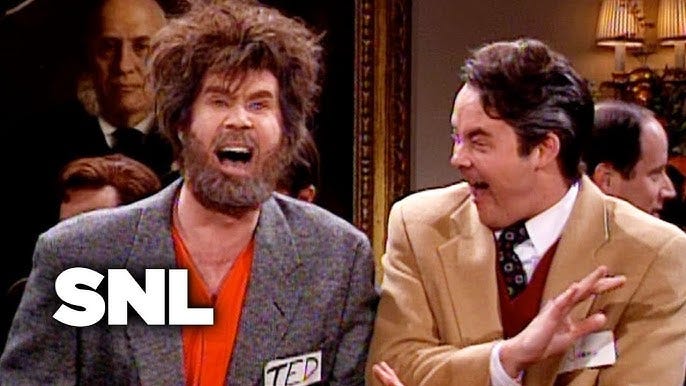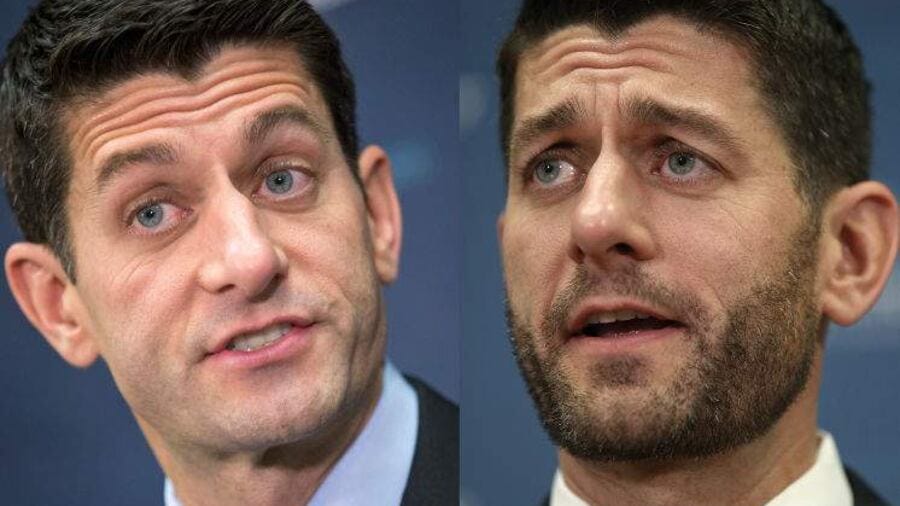Check out PART ONE for an even more prolonged and unnecessary introduction.
As promised, here’s my hard-hitting exposé on BEARDS in POLITICS. So, let’s get to it.
At the moment, Democrats find themselves in a weird spot. They are just as legislatively incompetent as the Republicans, but they keep losing elections, likely because a majority of voters hate them.
Because Democrats do dumb, inauthentic things.
You can say a LOT about our current President, whom I like to refer to as our “first ADHD President.” At least, he’s the first in our lifetimes…the 1800s produced some definitively weird candidates, many of whom would now receive a quick diagnosis.
Thomas Jefferson, for one. And there’s no doubt Andrew Jackson could have used some Vyvanse.
But to his credit, our current President is likely the most “authentic” to hold the office, at least if you bend the definition to fit Dave Chappelle’s perfect characterization of Trump as “an honest liar.”
Voters buy into Trump because he’s the proverbial “outsider”, at least in terms of personality and not having a filter. Whether or not you feel his actions justify such a status is a matter of personal opinion.
Voters have been desperate for anyone who doesn’t resemble a corporate product of our deeply flawed and often useless two-party system. This desire helps to explain Obama’s ascent, the Tea Party’s success, and Bernie Sanders’ popularity.
In short, people are sick of politicians.
And the politicians likely know this.
The Democrats’ biggest visible problem is that they come across as judgy know-it-alls masquerading as toothless (or wearing dentures in many cases) defenders of the working class.
And for the “both sides” readers in the audience, I realize Republicans do the exact same thing, just with less pretense and more American flag lapels. And a lot of them don’t possess their original teeth either.
An honest post-election autopsy reveals some hard truths for Democrats. I’ve been following political campaigns since I was a 9-year-old (I was a nerdy kid), but I have never seen one as jumbled and confusing as Kamala Harris’ ill-fated campaign.
Harris ran out of breath speaking about abortion rights and military interventions, then decided to campaign with the Cheney family, easily some of the ugliest political monsters our country has known, in a weird attempt at targeting the elusive and possibly mythical Never-Trump Republican.
But when asked what her campaign was about, Harris responded with one word.
Joy.
Okay.
Abortion. War. The Cheneys. Joy. I sense a disconnect here.
After what should have been an expected election outcome, Democrats re-entered that weird space that defines a minority party after a big loss.
In other words, they engaged in some “soul-searching” (a term big media LOVES to use).
There isn’t one collective revival strategy that has surfaced (these are Democrats after all), but they finally (maybe) realize that the shift from big media to big podcasts has left them behind.
A common post-election refrain is “the Democrats need to find their own Joe Rogan.” Of course, this doesn’t make any sense. Rogan’s success is partially a result of people no longer buying what big media is selling.
(Or, Democrats could ALSO go on Rogan’s podcast and speak directly to his audience. Just a thought.)
In this nether region of political impotence, a few opportunistic Democrats have tried to reach out to the demographics that currently hate them.
And the results are often hilarious.
Gavin Newsom, the beleaguered California governor, has attempted to move past the tragic wildfire disaster and position himself for an obvious centrist 2028 Presidential run.
Newsom is probably the most high-profile Democrat to enter the podcast world. He’s “rolled up his sleeves” (quite literally) and started his own podcast, hosting right-winger Charlie Kirk as his first guest.
The results are as awful and embarrassingly transparent as you may expect. Newsom screams “politician from San Francisco”, but now is trying to force a veneer of authenticity on people who will never in a thousand years vote for him.
It’s sad and funny to watch this public relations disaster unfold in real time. Of course, our dysfunctional two-party system works somewhat better when both parties are perceived as viable (or at least semi-competent) options by voters.
Since neither seems eager to achieve this status through legislative means, the focus shifts to image and the pretense of giving a shit about people.
Most politicians have little understanding of the lives of ordinary voters. This is even more pronounced the lower down the socio-economic ladder you look.
Democrats (and most Republicans) don’t understand people who listen to Joe Rogan’s podcast, something that can’t be explained through some McKinsey-derived, sterile focus group sample.
Most don’t have the capacity for such authenticity, likely because it requires astute self-reflection and a divergence from ignorant, tribal “which team are YOU on?” social branding.
So, instead, they reach for what they think are defining characteristics of a group of voters. This is why working-class men are often stereotypically associated with beer, trucks, and flags.
It’s a cheap and simple definition (and one that can be true). However, focusing on “branding” ignores the deeper issue, which are the soul-crushing facets of our lives that are slowly killing us.
So, politicians can either “roll up their sleeves” and dive into society’s ills, or they can grow a beard.
There is no doubt that this is a man who gives considerable thought to his beard. Buttigieg took his new persona to the Flagrant with Akaash Singh podcast, where he partook in some bro-centric banter.
Buttigieg is effective at delivering a message. He held his own, and his personal coming-out story feels genuine. However, his background as a corporate consultant at McKinsey is something that can’t be replaced with patchy facial hair.
Of course, Buttigieg isn’t the first to try this strategy. The prolonged and excessively stupid 2000 election recount weighed heavily on Al Gore, transforming the squeaky-clean Vice President into a less hilarious version of the Unabomber.
Buttigieg is also not the latest. Senator Chris Murphy is trying on a new look, likely prepping for his eventual Presidential run. Vastly unpopular former Canadian Prime Minister Justin Trudeau attempted a similar strategy. And of course, they both looked like pretentious, out of touch dumbasses.
Which brings us to Ted Cruz. After nearly losing to Beto O’Rourke in 2018, Cruz had to affirm his worth to tough-talking Texans in the form of rugged, sensationalized partisan politics and, of course, a beard.
Cruz’s beard lies somewhere between the “mirror watchers” and the “don’t give a shit” crowd. It’s not altogether bad, but of course, it’s both wildly inauthentic, despite being a vast improvement over his former hairless, smub and punchable Nixonian guise.
In a related note, O’Rourke also grew a beard after his 2018 loss, possibly marking the first time both the winner and loser tried to overcompensate simultaneously.
But sometimes, a truly more important and unforeseen life event triggers the decision. Kentucky Congressman Thomas Massie has a more compelling reason to sport a beard, having recently lost his 51-year-old wife, no doubt a traumatic episode for anyone to endure.
Political beards aren’t always awful. In some cases, they make a lot of sense. Take a look at this before-and-after picture of current Vice President J.D. Vance.
Well played.
Despite boasting a “round” face, Vance pulls off a beard. (He is from Kentucky, after all). His bearded career has proven more fruitful than the time he looked like a disgraced youth pastor who can’t legally be around kids.
Facial shape certainly plays a role in whether a guy can pull off a beard. Both round and oblong face shapes are problematic, sometimes accenting these features rather than hiding them.
The classic beard face is an oval or even diamond shape. They help to accentuate facial features while defining the symmetry of a person’s face. Symmetrical faces are psychologically perceived as more trustworthy and emotionally stable.
So, it makes sense that former Speaker of the House and Vice Presidential candidate Paul Ryan would benefit from growing a beard. However, Ryan proved to be the exception to this rule.
Ryan’s motives for growing a beard are painfully obvious. Ryan was trying to reinvent himself when his national profile cratered after the 2012 election. Previously known for being a wonky Washington insider, Ryan sought to boost his masculine chops, claiming that his new look was the result of a “hunting trip.”
I’ll save politicians cosplaying as hunters for another time. (There’s no doubt Tim Walz will make an appearance there.)
Essentially, Ryan double-dipped in the rugged mountain waters of Lake Machismo, linking the primal act of killing animals with the freedom of growing facial hair.
And of course, as history should have told Ryan, it was a hilarious failure.
Ryan is that rare breed of man who is born never to cultivate a beard. It simply doesn’t fit Ryan’s pasty, vulture cannibal boardroom robot persona.
Which is true for most politicians. Assuming they adhere to common sense.
Which they don’t.
So, they grow a beard.










A brilliant and incisive analysis of American politics in the photography era.
Honestly, the fact that the best presidents are clearly diagnosable reflects more of a modern over-diagnosis and over-pathologization of normal (and frequently beneficial) personality traits as illnesses than failings on their part.